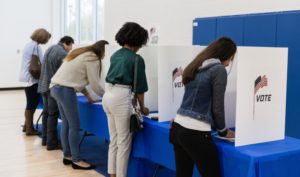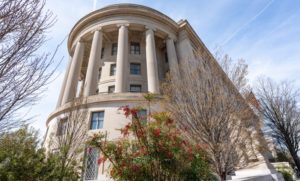
The FTC issues final rule mandating one-click subscription cancellations, the Justice Department sues Virginia over alleged election law violations, and more…
IN THE NEWS
- The U.S. Federal Trade Commission (FTC) announced a final rule that will require negative option programs—such as subscription-based services—to provide a simple mechanism to cancel features and immediately halt charges. The rule defines difficult cancellation policies, along with failure to disclose terms and material facts to consumers in the subscription sign-up process, as unfair or deceptive and prohibits them. The FTC emphasized that the agency receives thousands of complaints about negative options and recurring subscription practices per year. The FTC approved publication of the rule with a 3-2 vote. A dissenting statement is forthcoming.
- The U.S. Department of Justice filed a lawsuit against the state of Virginia, accusing the state and several of its officials of violating federal election laws by systematically removing voters from voter rolls within 90 days of an election. The Justice Department argued that Virginia’s actions breached the National Voter Registration Act, placed “qualified voters in jeopardy of being removed from the rolls,” and created “the risk of confusion for the electorate.” Virginia Governor Glenn Youngkin criticized the lawsuit as “politically motivated” election interference.
- The Nebraska Supreme Court ruled that felons who have completed their sentences, including probation or parole, are eligible to vote. The decision resolves confusion surrounding Nebraska Secretary of State Robert Evnen’s order instructing county officials to stop registering Nebraskans with past felony convictions to vote in accordance with state law. In the opinion, the court emphasized the importance of civic participation for rehabilitated individuals. By restoring voting rights to over 7,000 individuals, this decision could significantly impact voter turnout in Nebraska in the upcoming election.
- The Federal Aviation Administration (FAA) issued a final rule extending the prohibition of certain flights below altitudes of Flight Level 320—approximately 32,000 feet above sea level—in the Iraqi area of the Baghdad Flight Information Region (FIR). This prohibition applies to all U.S. air carriers, U.S. commercial operators, and FAA certified airmen, unless they are working for a foreign air carrier, for the next three years. The FAA took this action due to the “unacceptable level of risk to the safety” of U.S. civil aviation in the Baghdad FIR posed by the Iranian-aligned militia groups in the area.
- The Department of Homeland Security announced that all direct flights to the United States carrying persons who have traveled from, or were otherwise present in Rwanda within 21 days of travel, must land at one of three U.S. airports, which will be taking enhanced public health precautions. These restrictions are being implemented due to an outbreak of Marburg Virus Disease (MVD) in Rwanda. Affected flights must land at Chicago O’Hare International Airport, John F. Kennedy International Airport, or Washington-Dulles International Airport. These restrictions will remain in place until further notice.
WHAT WE’RE READING THIS WEEK
- In an article published in the Internet Policy Review, Oskar J Gstrein, Noman Haleem, and Andrej Zwitter, all of whom are professors at the Netherlands’ University of Groningen, discussed the European Union’s Artificial Intelligence Act (AIA) . The AIA is the most ambitious Artificial Intelligence (AI) regulation in the world, using a risk-based approach with four different classifications of risk to determine regulatory requirements for AI providers. The law also distinctly regulates general-purpose AI systems, like OpenAI’s ChatGPT, that cannot be easily put in a risk category because of the models’ broad applicability based on a variety of technical factors. Gstrein, Haleem, and Zwitter that such a distinction conflates the complexity of models with purpose. They also argued that the AIA’s success will rely on its enforcement capabilities, and specifically noted the importance of the proper and thoughtful creation of an enforcement office at the EU level that can monitor each country’s enforcement. Finally, Gstrein, Haleem, and Zwitter contended that the office must be properly staffed with experts in the AI field in order for the regulations to be intelligently applied to the rapidly developing technology.
- In a forthcoming article in the Minnesota Law Review, Bennett Capers, Associate Dean for Research and Stanley D. and Nikki Waxberg Professor of Law at Fordham Law School, and Gregory Day, associate professor at the University of Georgia, explored how state monopoly power perpetuates economic inequality, especially along racial lines. Capers and Day argued that states have long used monopoly power to benefit dominant groups at the expense of marginalized communities and have often escaped antitrust scrutiny. They contended that antitrust law, rooted in the Sherman Antitrust Act and influenced by Reconstruction principles of anti-state monopolism, should challenge discriminatory state monopolies, thus addressing lingering inequalities from the Reconstruction era.
EDITOR’S CHOICE
- In an essay in The Regulatory Review, Cary Coglianese, the Edward B. Shils Professor of Law and Director of the Penn Program on Regulation at the University of Pennsylvania, examined how President Trump’s political interference in prosecutorial decisions during his presidency undermined fundamental principles of procedural fairness. Coglianese explored several instances when Trump exerted pressure on prosecutors, particularly in cases involving his allies, and argued that this behavior violates the Due Process Clause of the U.S. Constitution. He concluded that such interference not only breaches legal obligations but also threatens legitimacy and public trust in the U.S. legal system.



